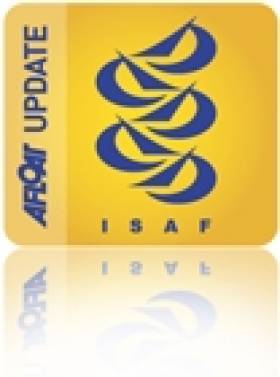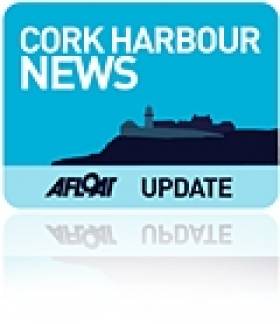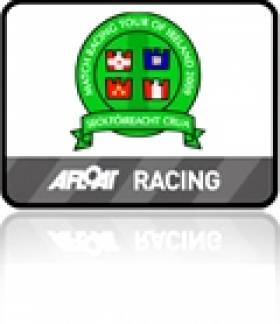Displaying items by tag: match race
Back to Back Congressional Cup Match Race Wins for Poole
The intensity of the 59th Congressional Cup, the opening event for the 2024 World Match Racing Tour, reached its peak today as USA’s Chris Poole and his Riptide Racing team won his second consecutive Congressional Cup and Crimson Blazer. Poole and his Riptide Racing team of Joachim Aschenbrenner, Bernardo Freitas, Mal Parker, Luke Payne, and Harry West defeated five-time Congressional Cup winner Ian Williams 3-1 in a tense final.
Showing dominance early, Poole claimed the first point of the event. With so much talent and experience in these boats, Williams and Poole pushed the match racing rules and boats to their maximum.
Reflecting on the victory, Chris Poole said “It’s an incredible feeling. It would be impossible without my team. We didn’t start the week the way we wanted to, but once we started sailing like we did last year, we were pretty confident it was going to be ours to win.”
 Chris Poole’s team rallied to come back strong with two wins and a final score of 3-1 to be able to wear his second Crimson Blazer Photo: Ian Roman
Chris Poole’s team rallied to come back strong with two wins and a final score of 3-1 to be able to wear his second Crimson Blazer Photo: Ian Roman
Fighting five-time Congressional Cup champion Ian Williams, Poole added, “It was a really close battle. Ian is a phenomenal competitor, so we knew it was going to be a big fight. We were up to the challenge and my guys were ready to go.”
As Afloat previously reported, the Williams crew included Northern Ireland sailor Oisin McClelland.
After Williams won the second match against Poole to tie the score, Poole’s team rallied to come back strong with two wins and a final score of 3-1 to be able to wear his second Crimson Blazer.
Royal St. George's Tom Higgins Fights for Semi-Final Place at 2023 International Youth Match Racing Championship
Royal St. George's Tom Higgins is fighting for a semi-final place at the 2023 International Youth Match Racing Championship in Australia.
The Harken-sponsored Championship is hosting some of the World’s best youth match racing talent, with competitors travelling from across the world, including the UK and Ireland, New Zealand, Canada and Brazil, as well as a strong representation from across Australia.
Racing commenced Tuesday and is running through until Friday, 8 December, in Pittwater, NSW.
It has been an action-packed season for Higgins, an Irish ILCA ace from UCD that saw him compete at the USA's Governor's Cup in July, as well as a historic team race win at BUSA in April and the 75th ITRA title on home waters.
At the end of the first day of racing, with nine flights completed, RPAYC’s team of Daniel Kemp (skipper), Isabella Holdsworth, William Hough, Lachlan Wallace and Charlie Verity were top of the leaderboard.
 2023 International Youth Match Racing Championship Leaderboard
2023 International Youth Match Racing Championship Leaderboard
The teams from Rutland Sailing Club (Great Britain) and Royal Sydney Yacht Squadron (AUS) were in joint 2nd place with the rest of the competition spread out among the remaining places.
Experienced Race Officer Ted Anderson commended sailors for their conduct during the first day of competition, “The Crews have excelled and are really well behaved, both on and off the water, which made Race Management that much easier for our team”.
 Flags of the competing nations fly at the Royal Prince Alfred Yacht Club for the 2023 International Youth Match Racing Championship
Flags of the competing nations fly at the Royal Prince Alfred Yacht Club for the 2023 International Youth Match Racing Championship
Leading into day 2, the course was set at the top of Morning Bay, and the afternoon continued to pump a Southerly down Pittwater, which had the start of racing in 14knts before dropping slightly by midday, averaging 9-11knots.
The southerly tested boat handling skills, especially with kites hoisted when screaming in to round the gate marks, with some teams using their spinnakers as sea drogues.
 Established in 1992, the HARKEN International Youth Match Racing Championship has grown into a world-renowned international youth event.
Established in 1992, the HARKEN International Youth Match Racing Championship has grown into a world-renowned international youth event.
Round Robin 1 finished with 4 teams on 7 wins heading into Round Robin 2. At the close of racing, Ben Tylecote from Rutland Sailing Club, UK, was the stand-out leader. Tylecote and his crew achieved 12 wins from 14 matches.
Round Robin 2 will be wrapped up tomorrow, with the top four Skippers hoping to qualify for the Stage 3 Semi Finals.
#wmr – The Petit Final led off today and provided a brilliant introduction to the display of match racing that was enthralling for the spectators to watch today writes Claire Bateman. Caroline Sylvan (SWE) put up a tough fight against Stephanie Roble (USA), but the American crew proved to be strongest at the end. With two straight wins they secured the bronze in the 2014 ISAF Women's Match Racing World Championship, the first event out of five on the 2014 Women's International Match Racing Series.
Finally the climax of this outstanding match racing event arrived and all were waiting with bated breath expecting a tremendous fight that lived up to all expectations and provided a display unequalled on the Cork Harbour scene for a number of years. Following a short delay to allow for the swopping of Stephanie Roble's (USA) boat, who in fact had come third in the series thus taking the bronze spot, all was in readiness and the scene set for the epic battle of the week and this in fact was what it turned out to be. With SSW breeze of 15 to 25 knots, a flooding tide, sunshine and shifty winds Anna Kjellberg of Sweden, World No. 2 and Camilla Ulrikkeholm World No. 1 entered the ding dong competition.
Ulrikkeholm gained an early advantage by winning the first match of the final. The flukey winds together with the flooding tide and strong current, really put it up to the sailors who gave it their all with a masterful display which was to last through the races for the final.
In the second match it was Kjellberg got through to victory and thus leaving it all to play for in match 3. Both teams started aggressively in race 3 with both clearly stating their intention to do the business. The Dane appeared to be in control of the situation when the Swede had a poor bottom mark rounding and it looked to be all over for her. However, the wily Swede went up the right side the beat and it paid off handsomely for her, taking the lead from the Dane and then held on in very tight circumstances and took the win.
Race 4 started with the tide turned. The start was again very aggressive with the Swede appearing to have the better of it. The wind seemed at it's strongest for this race. Both boats drag raced up the beat heading left. The Dane appeared marginally faster in the stronger conditions and got through. The pattern continued until the bottom mark when the Swede, who clearly wanted the right side of the course, threw a couple of dummy tacks to break the Dane's tight cover. Five minutes of racing later and it was all over bar the shouting. The smooth water on the right and a lucky shift took the Swede past the Dane and once through she never looked like losing and so it proved to be with the Swede taking the right hand side of the course downwind and gybing in the strongest breeze to power through to the finish and taking the winner's title in the final of the 2014 ISAF Women's Matching World Championships.
The prize giving followed in a very excited atmosphere with all very glad to be finished after a grueling week and showering the winner with congratulations and good wishes. A very lovely little human touch was added and made a perfect ending to the ceremonies when by kind permission of ISAF, Anna Kjellberg's little five week old daughter, Vera, was brought out to join with her mother to receive her very own gold medal to mark the auspicious occasion.
A wonderful end to a wonderful week.
ISAF Press Release
Olympic sailor and World #2 Anna Kjellberg of the Royal Gothenburg Yacht Club was crowned 2014 ISAF Women's Match Racing World Champion in Cork Harbour this afternoon. Together with her crew – Karin Almquist, Vanja Lundberg and Annika Carlunger – the Swede defeated Danish World #1 Camilla Ulrikkeholm (DEN) 3 – 1 in their Scandinavian battle off Crosshaven, the home of the world's oldest yacht club.
"This is absolutely incredible. We've never before sailed a regatta with such a great crew feeling," the Swedish skipper smiled. "The last few weeks of my life have been completely crazy, giving birth to my daughter just five weeks ago, and now this," she said, laughing and shaking her head.
With three victories needed to win the final of the 2014 ISAF Women's Match Racing World Championship, Ulrikkeholm gained an early advantage by winning the first match of the final. Strong but very shifting and puffy winds, together with a swift current, put the sailors to the test. The second meeting ended in a fierce fight around the course, but Kjellberg kept control and passed the finish line one boat length ahead of her opponent.
When the Swedes won the third match, they put Ulrikkeholm under great pressure to break back. In the fourth match the Danes got away ahead, but didn't cover the Swedes well enough on the second upwind. Kjellberg was allowed to tack away for clear air, found an advantageous wind shift and passed into a leading position which she was able to maintain to the finish.
"We've improved in every match during this regatta, and we know that in match racing it's never over until it's over. I think we had the right nerves today, with a rather calm feeling in the boat even when the competition was tough," Kjellberg analysed after her golden match.
On her loss Ulrikkeholm commented, "In these conditions it was hard also to be ahead. We made some mistakes not covering the Swedes enough, and then we didn't have as good boat handling as the other days of the regatta."
Kjellberg's bowman Annika Carlunger had no less than seven World Championship silver medals before this regatta, sailing with different helmsmen over the years. Now she got her eagerly awaited gold medal and shouted after having passed the finish line, "Finally, after all these years."
In the Petit Final Caroline Sylvan (SWE) put up a tough fight against Stephanie Roble (USA), but the American crew proved to be strongest at the end. With two straight wins they secured the bronze in the 2014 ISAF Women's Match Racing World Championship, the first event out of five on the 2014 Women's International Match Racing Series.
"We never felt comfortably in control, but my team did an awesome job all the way around the course," said Roble who praised her crew.
"We've done some fantastic races, and we're proud to be the second Swedish crew in the top four of this Championship," Sylvan smiled, not too disappointed.
Results in the 2014 ISAF Women's Match Racing World Championship, the first event out of five on the 2014 Women's International Match Racing Series:
Final:
Anna Kjellberg, SWE, defeated Camilla Ulrikkeholm, DEN, 3 – 1
Petit final:
Stephanie Roble, USA, defeated Caroline Sylvan, SWE, 2 – 0
Total results (skipper name, country, prize money, WIM Series points):
1. Anna Kjellberg, SWE, 3 000 €, 25
2. Camilla Ulrikkeholm, DEN, 2 000 €, 22
3. Stephanie Roble, USA, 1 500 €, 20
4. Caroline Sylvan, SWE, 1 250 €, 16
5. Anne-Claire Le Berre, FRA, 1 000 €, 15
6. Klaartje Zuiderbaan, NED, 750 €, 14
7. Lotte Meldgaard Pedersen, DEN, 500 €, 13
8. Claudia Pierce, NZL, – ,12
9. Annabel Vose, GBR, – , 10
10. Mary O'Loughlin, IRL, – , 8
11. Laura Dillon, IRL, – , 6
12. Lucie Scheiwiller, FRA, – , 4
13. Anne-Christianne Kentgens, NED, – , –
#matchrace – A most unusual event will take place off Albert Quay, Cork, on June 6th from 2pm to 6pm when some of the world's top ranked women match racing sailors will match race in J80 sailboats with full running commentary explaining the intricacies of the sport for the spectators writes Claire Bateman.
The ISAF Womens Match Racing World Championship to be sailed in Crosshaven from June 3rd to 8th is the opening event for the 2014 Womens Match Series. It is a professional sailing circuit hosted by the Womens International Match Racing Association for the world's leading women match racing sailors. As the name implies, the crews meet two by two in exciting duels that can easily be followed and, most importantly, can be understood by spectators. For the rest of the days involved the daily racing can be viewed from Camden Fort Meagher in Crosshaven.
Another first for the city will be the appearance of the Irish Navy's new flagship, LE Samuel Beckett which will be open to the public for the occasion giving all a chance to see this magnificent new vessel.
The event is sponsored by Cork County Council and the Port of Cork and provides an excellent opportunity to promote Cork and Crosshaven on the world map and to showcase the facilities of Cork Harbour and surrounding areas.
Entertainment will be provided and there will be a full bar and high quality artisan food along the quay for everyone to enjoy. Meitheal Mara with their boats will add to this spectacular maritime occasion.
Irish Youth Crew Are European Match U23 Racing Champions
#matchrace – Team Ireland with skipper Philip Bendon are the new Match Race Youth European Championship for 2013. Bendon's three man crew on Lake Constance yesterday included cousin James Bendon from Cork, Christopher Tiernan and Bruno Van Dyke. The Irish crew are nautical studies students from Ringaskiddy and Southampton.
The silver medal went to Britain's Mark Lees.
The Irish under 23 crew beat 15 teams drawn from 14 countries in boats which were previously sailed in the World Match Racing Tour in San Moritz.
The 2013 European Youth Match Racing Championship was organised by the Konstanzer Yacht Club (GER) in co-operation with the Jugend Regatta Förderverein, the Schüler Segelclub Konstanz (GER), Jugendsegeln Steckborn (SUI) and the Yacht Club Bregenz (AUT), an international line-up of yacht clubs.
































































